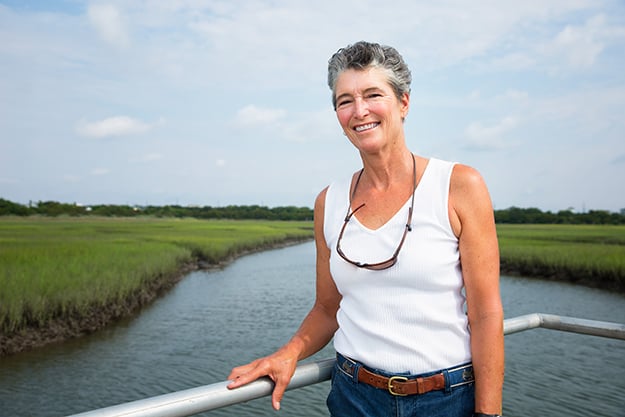Waterworks
Ann Brooks makes waves as Wrightsville Beach Elementary’s marine science coordinator

More like a miniature Jacques Cousteau than frilly little girl, ANN “CISSIE” BROOKS was always outside exploring.
It was at the family’s second home in Oriental, North Carolina, where she took full advantage of her mother’s only rule: Have fun, enjoy the water, but check in at least once throughout the day. Whether it was sailing, fishing, crabbing, surfing, or building miniature oceanic scenes inside shoeboxes, by the water is where Brooks felt at home.
To later move to Wrightsville Beach and to study at University of North Carolina Wilmington in marine biology just made sense. But, the difficult reality of mastering chemistry, physics, and even math was something she didn’t plan on and would eventually switch gears and major in English – a decision that would ultimately (to her surprise) pay off.
Deep in the bowels of the court building she longed for something different. Something, again, on the water. It wouldn’t take long before the call of the ocean proved too strong to withstand and Brooks found herself back at Wrightsville Beach.
In 1999, Brooks accepted a part time job at Wrightsville Beach Elementary School as the school counselor. This green-light decision, Brooks explains, was based mostly in part around her experience in grant writing. And this is where things come full circle. This is where Brooks would finally have her chance to work in the marine science after all.
“I had a friend who was a member of the Wilmington Rotary Club tell me that the club awarded grants. She suggested that I write one to get a pier built at our school. So, I did. And we were awarded the seed money to get the ball rolling,” she says.
Since then, the pier has become Brooks’ outdoor classroom where she’s able to teach the students about plants and animals that live in the salt marsh.
“They learn to catch crabs and fish. They learn to collect data on water quality and to measure fish and crabs. They even learn to work in teams and overcome their fears,” she says. “It’s a place where they can have fun, learn new skills, and figure out how we are all connected.”
Once the pier was completed, Pansy Rumley, the school principal at the time, designated Wrightsville Beach Elementary as a Marine Science Focus School. And Brooks assumed the role of the first marine science coordinator. Since, the program has been evolving and thriving with the help of countless community members.
In 2007, Becca Beitel showed Brooks a small ad in a magazine from the Future Fishermen Foundation requesting grant proposals for fishing and boating equipment. Without hesitating, Brooks went to work.
And once again, Brooks succeeded.
This time, she was awarded enough money for five kayaks for Wrightsville Beach Elementary. Soon after, several local businesses and nonprofit organizations (including the WBS Foundation and PTA) chipped in to donate even more kayaks for the school’s marine science program.
Before long the school hosted its own fleet: eighteen kayaks in total.
“I think back at how crazy it all seems – how everything worked out for a reason,” Brooks says. “I dreamed of being a marine biologist, but had to switch to an English major. Then, I had several jobs, which allowed me to learn to write grants. And that helped me succeed in writing for our school.
“Now, I’m doing what I originally dreamed of doing – working by the water. But, the most wonderful thing, the one thing I didn’t plan on, but feel blessed to be able to do, is share and partake in the joy of the salt marsh and our local ecosystem with our kids. It’s God’s hand at work.”
Over the years, Brooks has worked with the North Carolina Coastal Federation, Cape Fear Community College, Seapath Marina, and many other local businesses and organizations to bring in as many educational opportunities as possible for her students.
It is, then, no surprise that she was inducted into the Waterman Hall of Fame as Woman of the Year in October. The Wrightsville Beach Museum of History award recognizes watermen and women who represent sportsmanship both in and out of the water, according to museum officials. And Brooks more than fits the bill.
And somewhat like Cousteau, Brooks was busy scrapping barnacles off her boat when the news of the award was given.
“My neighbor drove up and was the first to offer congratulations. I had no idea what he was talking about,” she chuckles.
In the upcoming school year, Brooks expects to partner with the UNCW chapter of Plastic Ocean Project (POP), teaching her students about the importance of reducing the use of plastics and how to keep them out of the ocean. She plan to continue teaming up with several community organizations for the marine science program such as Audubon North Carolina, a platform that teaches students about shorebirds and the importance of bird sanctuaries on local beaches.
And with the support of the Harbor Island Garden Club, Brooks’ students also will make and post signs around the perimeter of the sanctuaries warning visitors about disturbing the nesting birds.
“I guess I was just in the right place at the right time,” Brooks says humbly about her accomplishments. “Now, I get to share what we as a community have created with so many precious children. How lucky can someone be?”